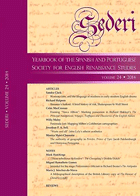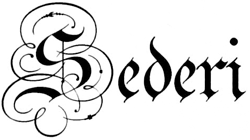
Sederi 24
Sederi 24 — 2014
EDITORS
Berta Cano Echevarría & Ana Sáez-Hidalgo
REVIEW EDITOR
Francisco J. Borge López
ISSN 1135-7789
Willy Maley, “Peninsula Lost: Mapping Milton’s Celtiberian cartographies.” SEDERI 24 (2014): 69-93.
DOI: https://doi.org/10.34136/sederi.2014.4 Download PDF
Abstract
In A Mask Presented at Ludlow Castle (1634), John Milton depicts Comus “ripe and frolic of his full grown age, Roving the Celtic and Iberian fields.” While Milton’s complex engagement with Portugal and Spain has been the subject of some discussion by critics, few attempts have been made to place his writings on the Iberian Peninsula within the wider context of his theories of climatic influence and colonialism, beyond the “western design” against Spanish colonial possessions. Anti-Catholicism and anti-imperialism may be the key to Milton’s Cromwellian correspond-ence with Spain and Portugal on behalf of the English republic in the 1650s but his Iberian interests can be viewed too as part of a deeper excavation of British and Irish histories. The purpose of this article – its “roving commission” – is to explore the presence of the Peninsula in Milton’s work from “Lycidas” (1637) through to The History of Britain (1670) in relation to recent archipelagic readings of Milton, examining the ways in which Celtic and Iberian concerns are intertwined in Milton (as indeed they were for his predecessor, Edmund Spenser).
Keywords: Britain; Catholicism; Celtic; colonialism; Cromwell; Empire; England; Europe; Iberia; Ireland; John Milton; monarchy; Naples; “New World;” Portugal; Revolution; Spain; translation.
References
Alves, Hélio J. S. 2009. “Milton after Corte-Real: Religion, Verse, and Reversal of Iberian Epic in Paradise Lost.” Modern Philology 106 (2009): 555-577.
Armitage, David 1992. “The Cromwellian Protectorate and the Languages of Empire.” The Historical Journal 35/3: 531-555.
Armitage, David 1995. “John Milton: Poet Against Empire.” Eds. David Armitage, Armand Himy and Quentin Skinner. Milton and Republicanism. Cambridge: Cambridge University Press: 206-225.
Baldwin, Geoff 2004. “Ascham, Anthony (bap. 1614, d. 1650).” Oxford Dictionary of National Biography. Oxford University Press. <url: http://www.oxforddnb.com/view/article/731>. Last accessed 26/2/13.
Birch, Thomas, ed. 1738. A Complete Collection of the Historical, Political, and Miscellaneous Works of John Milton. London: Printed for A. Millar.
Burke, Peter 2009. “The Crisis in the Arts of the Seventeenth Century: A Crisis of Representation?” The Journal of Interdisciplinary History 40/2: 239-261.
Campbell, Gordon, ed. 1980. John Milton: The Complete Poems. London: J. M. Dent.
Campbell, Gordon 1996. “Milton’s Spanish.” Milton Quarterly 30/3: 127-32.
Campbell, Gordon and Thomas N. Corns 2008. John Milton: Life, Work, and Thought. Oxford: Oxford University Press.
Canino, Catherine 1998. “The Discourse of Hell: Paradise Lost and the Irish Rebellion.” Milton Quarterly 32/1: 15-23.
Carroll, Clare 1996. “Spenser and the Irish Language: The Two Sons of Milesio in A View of the Present State of Ireland, The Faerie Queene, Book V, and the Leabhar Gabhála.” The Irish University Review 26/2: 281-290.
Cohen, Walter 1985. Drama of a Nation Public Theater in Renaissance England and Spain. Ithaca, New York: Cornell University Press.
Cook, Albert S. 1907. “Two Notes on Milton.” The Modern Language Review 2/2: 121-128.
Cooper, Helen 2013. “Milton’s King Arthur.” Review of English Studies 65/269: 252-265. <doi: 10.1093/res/hgt074>. Last accessed 31/01/2014.
Cromwell, Oliver 1655. A declaration of His Highnes, by the advice of his council; setting forth, on the behalf of this Commonwealth, the justice of their cause against Spain. Friday the 26th of October, 1655. Ordered by His Highness the Lord Protector, and the council, that this declaration be forthwith printed and published. Hen: Scobell, Clerk of the Council. London: Printed by Henry Hills and John Field, Printers to His Highness.
Dali, Salvador (1974) 2013. Paradise Lost. William Bennett Gallery, New York, NY. <url: http://www.williambennettgallery.com/artists/dali/ portfolios/paradis.php>. Last accessed 12/10/2013.
Davies, Tony 1995. “Borrowed Language: Milton, Jefferson, Mirabeau.” Eds. David Armitage, Armand Himy and Quentin Skinner. Milton and Republicanism. Cambridge: Cambridge University Press: 254-271.
Evans, J. Martin 1996. Milton’s Imperial Epic. Ithaca: Cornell University Press.
Fallon, Robert Thomas 1993. Milton in Government. University Park: Pennsylvania State University Press.
Fallon, Robert Thomas 1995. Divided Empire: Milton’s Political Imagery. University Park: Pennsylvania State University Press.
Fenton, Mary C. 2005. “Milton’s View of Ireland: Reform, Reduction, and Nationalist Polity.” Milton Studies 44: 203-229.
Fuchs, Barbara 2002. “Spanish Lessons: Spenser and the Irish Moriscos.” Studies in English Literature 1500-1900 42/1: 43-62.
Giraffi, Alessandro 1647. Le Rivolutioni di Napoli descritte dal Signor A. G. Venice. Translated into English in 1650 by James Howell as An exact historie of the late revolutions in Naples. London: Printed by R.A. for R. Lowndes.
Green, Georgina 2012. “The People and the Poet Redeemed: William Wordsworth and the Peninsular Uprising.” ELH 79/4: 935-962.
Greenspan, Nicole 2010. “News and the Politics of Information in the Mid Seventeenth Century: the Western Design and the Conquest of Jamaica.” History Workshop Journal 69: 1-26.
Guibbory, Achsah 2006 (1998). Ceremony and Community from Herbert to Milton: Literature, Religion, and Cultural Conflict in Seventeenth-Century English Literature. Cambridge: Cambridge University Press.
Herron, Thomas 2002. “The Spanish Armada, Ireland and Spenser’s The Faerie Queene.” New Hibernia Review 6/2: 82-105.
Hodgkins, Christopher 2002. “The Uses of Atrocity: Satanic Spaniards, Hispanic Satans, and the ‘Black Legend’ from Las Casas to Milton.” Reforming Empire: Protestant Colonialism and Conscience in British Literature. Columbia and London: University of Missouri Press: 54-76.
Howell, A. C. 1960. “Paradise Lost in Spanish.” Seventeenth-Century News 18: Item 8.
Howell, A. C. 1962. “Anibal Galino’s Spanish Translation of Milton’s Paradise Lost.” Revue de Littérature Comparées 36: 438-443.
Kerrigan, John 2008a. “The Anglo-Scoto-Dutch Triangle: Milton and Marvell to 1660.” Eds. David Loewenstein and Paul Stevens. Early Modern Nationalism and Milton’s England. Toronto: University of Toronto Press: 217-248.
Kerrigan, John 2008b. Archipelagic English: Literature, History, and Politics 1603-1707. Oxford: Oxford University Press.
Landon, Michael 1965. “John Milton’s History of Britain: Its Place in English Historiography.” University of Mississippi Studies in English 6: 59-76.
Lim, Walter S. H. 1998. “‘Space May Produce New Worlds’: Theological Imperialism and the new Poetics of Colonialism in Paradise Lost, Paradise Regained, and Samson Agonistes.” The Arts of Empire: The Poetics of Colonialism from Raleigh to Milton. London and Newark, New Jersey: Delaware Press/Associated University Presses: 194-241.
Lipking, Lawrence 1996. “The Genius of the Shore: Lycidas, Adamastor, and the Poetics of Nationalism.” PMLA 111/2: 205-21.
Loewenstein, David 1992. “‘An Ambiguous Monster’: Representing Rebellion in Milton’s Polemics and Paradise Lost.” Huntington Library Quarterly 55/2: 295-315.
MacLachlan, Hugh 1990. “Arthur, Legend of.” Ed. A. C. Hamilton. A Spenser Encyclopedia. Routledge: London and Toronto: 64-6.
Maley, Willy and Rory Loughnane, eds. 2013. Celtic Shakespeare: The Bard and the Borderers. Farnham, Surrey and Burlington, Vt: Ashgate.
Martin, Rodger 1998. “The Colonization of Paradise: Milton’s Pandemonium and Montezuma’s Tenochtitlan.” Comparative Literature Studies 35/4: 321-55.
Marx, Karl and Friedrich Engels 1986 (1971). Ireland and the Irish Question. Moscow: Progress Publishers.
Mazur, Peter 2013. The New Christians of Spanish Naples 1528-1671: A Fragile Elite. Houndmills, Basingstoke: Palgrave Macmillan.
Mickle, William Julius 1776. The Lusiad; or, The Discovery of India. An Epic Poem. Oxford: Jackson and Lisner.
Milton, John 1641a. Animadversions upon the remonstrants defence against Smectymnuus. London: Printed for Thomas Underhill.
Milton, John 1641b. Of reformation touching church-discipline in England. London.
Milton, John 1641c. The 1644 church-government urg’d against prelaty by Mr. John Milton; in two books. London.
Milton, John 1644. Areopagitica; a speech of Mr. John Milton for the liberty of vnlicens’d printing, to the Parlament of England. London.
Milton, John 1645. Tetrachordon: expositions upon the foure chief places in scripture, which treat of mariage, or nullities in marriage. London.
Milton, John 1649a. Articles of peace made and concluded with the Irish rebels and papists by James Earle of Ormond … also, a letter sent by Ormond to Col. Jones, Governour of Dublin, with his answer thereunto: and a representation of the Scotch Presbytery at Belfast in Ireland: upon all which are added observations. London: Printed by Matthew Simmons.
Milton, John 1649b. The tenure of kings and magistrates. 2nd ed. London.
Milton, John 1650 (1649). Eikonoklestes in answer to a book intitl’d Eikon basilike the portrature His Sacred Majesty in his solitudes and sufferings the author J.M. London.
Milton, John 1692 (1651). A defence of the people of England by John Milton; in answer to Salmasius’s Defence of the king. London.
Milton, John 1670. The history of Britain. London.
Milton, John 1682. A brief history of Moscovia. London.
Musi, Aurelio 2013. “Political History.” Ed. Tommaso Astarita. A Companion to Early Modern Naples. Leiden: BRILL: 131-52.
Naddeo, Barbara Ann 2004. “Topographies of Difference: Cartography of the City of Naples, 1627-1775.” Imago Mundi 56/1: 23-47.
Patrides, C. A. 1962. “As relações, de Milton com Portugal.” Revista de Faculdade de Letras de Universidade de Lisbõa 6: 413-19.
Peers, E. Allison 1926. “Milton in Spain.” Studies in Philology 23/2: 169-83.
Pittock, Murray 1999. Celtic Identity and the British Image. Manchester: Manchester University Press.
Preston, Paul 2004. “The Answer Lies in the Sewers: Captain Aguilera and the Mentality of the Francoist Officer Corps.” Science and Society 68/3: 277-312.
Preston, Paul 2012. The Spanish Holocaust: Inquisition and Extermination in Twentieth-Century Spain. London: HarperPress.
Quijada, Mónica 2008. “From Spain to New Spain: Revisiting the Potestas Populi in Hispanic Political Thought.” Mexican Studies/Estudios Mexicanos 24/2: 185-219.
Rachum, Ilan 1995. “The Meaning of ‘Revolution’ in the English Revolution (1648-1660).” Journal of the History of Ideas 56/2: 195-215.
Raymond, Joad 2004. “Complications of Interest: Milton, Scotland, Ireland, and National Identity in 1649.” The Review of English Studies 55/220: 315-45.
Revard, Stella P. 2013. “The Design of the 1645 Poems”. Ed. Edward Jones. Young Milton: The Emerging Author, 1620-1642. Oxford: Oxford University Press: 206-20.
Schwyzer, Philip 1997. “Purity and Danger on the West Bank of the Severn: The Cultural Geography of A Masque Presented at Ludlow Castle, 1634.” Representations 60: 22-48.
Shawcross, John T. 1991. John Milton and Influence: Presence in Literature, History and Culture. Pittsburgh, PA: Duquesne University Press.
Shawcross 1998. “John Milton and His Spanish and Portuguese Presence.” Milton Quarterly 32/2: 41-52.
Stradling, R. A. 1994. The Spanish Monarchy and Irish Mercenaries: The Wild Geese in Spain, 1618-68. Dublin: Irish Academic Press.
Walker, Roger M. 1994. “Sir Richard Fanshawe’s Lusiad and Manuel de Faria e Sousa’s Lusíadas Comentadas: New Documentary Evidence.” Portuguese Studies 10: 44-64.
Wordsworth, William 1809. Concerning the Relations of Great Britain, Spain, and Portugal, to Each Other, and to the Common Enemy, at This Crisis; and Specifically as Affected by the Convention of Cintra: The Whole Brought to the Test of Those Principles, by Which Alone the Independence and Freedom of Nations Can Be Preserved or Recovered. London: Longman.
